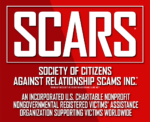
SCARS Institute’s Encyclopedia of Scams™ Published Continuously for 25 Years

SCARS™ Anti-Scam Tips: Dating Website Profiles
Updated August 2017 / December 2018
Yes, All Dating Websites Have Scammers! Some Are Drowning In Them!
All Dating Websites Are Very High Risk
From our own observations, almost all dating websites appear to have a very high percentage of Scammers from Africa and Eastern Europe. They make up the majority of new profiles on many of the dating websites from what we have seen. Of course, Plenty of Fish is the award winner because it is free. Any dating website that allows any form or posting profiles for free is going to be flooded with scammers.
Because of the fact that the scammers use multiple accounts, they are able to take advantage of legitimizing techniques because they have “others” they can refer – so they gain quick advantages on many of these sites.
The scammers engage in the basic behaviors of reviewing photos, and wanting to meet, hoping you will also connect. Plus they continue to figure out ways to get you messaging outside the dating site.
Here Are A Typical Page Of Profiles From A Dating Website BADOO.com
Spotting Scammers: They Are Fairly Easy To Spot From The Following
This applies to dating website profiles and also social media:
- Anyone that uses a last name as a first name (though this is only about 10% of the scammers that do this)
- Anyone that lists a ridiculous age range, such as “Wants to date with guys, 23-65” – but you will also see “Wants to date with guys, older than 30“
- Look at the age of the person and the photo – they will not match – it is possible that a real person is not using recent photos, but do you want to talk to them anyway?
- Look at the Profile Verification: they have text message phone numbers so this means nothing, they have Facebook and Google plus accounts so this means nothing too!
- Look at their location. For example: they list Miami or Los Angeles – we all know that all big metro areas have numerous districts and towns within them, but they list the generic place.
- They tend to cluster in certain towns and cities. Testing their knowledge about these proves fatal to them, so they generally don’t answer these questions (go on Google and look up some business in that town that a local should know) (local parks and landmarks are also good tests)
- Real people have a lot of photos – scammers generally have a couple – one trick they use is to reload them several times to make it look like they have a larger album
- When your popularity goes up, you are probably being scanned by the scammers, especially as time goes by – since with many sites it is all about “Who’s New”
- On-line hours – real people are usually online in normal hours for your time zone – very late (after 1 am) at night is a hint that it’s a scammer.
- Military personnel – scammers love to impersonate military personnel, but don’t get Military structure – if you do, use it to your advantage (look at our guides on the U.S. Military that can be found on our home page) – they are great ways to catch them in stupid answers.
- Look at their interests – you will find odd and outdated interests, like: CSI, Lost, and older TV shows and movies. Real people have quirky interests, and interests that are local and make sense. Or they have NONE Also if they have an interest that you don’t recognize, Google it – if it is mostly European or African – run away!
- Anyone that claims to be using a family member’s or friend’s profile is a dead give away, and a violation of the site’s terms and conditions – by definition they are impersonating someone else
- Look at the age, a common mistake is that they put the year of birth in as their age! Stupid scammers!
- In messaging, the scammers trip themselves up in several ways!
- Claim they have languages they don’t have
- Use scammer grammar – watch for it
- Refuse to answer questions about their town in detail
- Don’t seem to read previous message posts that should be right in front of them
- Bypass certain topics
- If you mention scammers they claim not to know what you are talking about
- If you catch one and confront them, they don’t know what you mean – a real person accused of being a scammer would be upset
- If you ask out of the blue: “Do you live in a suburb or Accra or in the city proper” (same for Lagos) [Lagos is the Nigerian city where the activity clusters and Accra is in Ghana]
As a user on a dating site, we suggest that you make your photos PRIVATE. That way you can share them when you want, but keep them hidden from the scammers.
We strongly urge ALL Dating Website owners to do the right thing, and do a comparison between the location given for the profile and the login IP addresses – this is easy tech and something all dating sites should do. If they don’t match, send them for a human review or delete them – this is the best way to restore faith in your site!
A Gallery Of Female Dating Website Scammers:
A lot of the same faces over and over and over!

SCARS™ Team
A SCARS Division
Miami Florida U.S.A.
END
– – –
Tell us about your experiences with Romance Scammers in our Scams Discussion Forum on Facebook »
– – –
FAQ: How Do You Properly Report Scammers?
It is essential that law enforcement knows about scams & scammers, even though there is nothing (in most cases) that they can do.
Always report scams involving money lost or where you received money to:
- Local Police – ask them to take an “informational” police report – say you need it for your insurance
- Your National Police or FBI (www.IC3.gov)
- The SCARS|CDN™ Cybercriminal Data Network – Worldwide Reporting Network HERE or on www.Anyscam.com
This helps your government understand the problem, and allows law enforcement to add scammers on watch lists worldwide.
– – –
Visit our NEW Main SCARS Facebook page for much more information about scams and online crime: www.facebook.com/SCARS.News.And.Information
To learn more about SCARS visit www.AgainstScams.org
Please be sure to report all scammers HERE or on www.Anyscam.com
All original content is Copyright © 1991 – 2018 SCARS All Rights Reserved Worldwide & Webwide – RSN/Romance Scams Now & SCARS/Society of Citizens Against Relationship Scams are all trademarks of Society of Citizens Against Relationship Scams Incorporated (formerly the Society of Citizens Against Romance Scams)
Legal Notices:
All original content is Copyright © 1991 – 2018 SCARS All Rights Reserved Worldwide & Webwide. Third-party copyrights acknowledge.
SCARS, RSN, Romance Scams Now, SCARS|GLOBAL, SCARS, Society of Citizens Against Relationship Scams, Society of Citizens Against Romance Scams, SCARS|ANYSCAM, Project Anyscam, Anyscam, SCARS|GOFCH, GOFCH, SCARS|CHINA, SCARS|CDN, SCARS Cybercriminal Data Network, Cobalt Alert, Scam Victims Support Group, are all trademarks of Society of Citizens Against Relationship Scams Incorporated.
Contact the law firm for the Society of Citizens Against Relationship Scams Incorporated by email at legal@AgainstScams.org
-/ 30 /-
What do you think about this?
Please share your thoughts in a comment below!
Table of Contents
- Yes, All Dating Websites Have Scammers! Some Are Drowning In Them!
- All Dating Websites Are Very High Risk
- Here Are A Typical Page Of Profiles From A Dating Website BADOO.com
- Spotting Scammers: They Are Fairly Easy To Spot From The Following
- A Gallery Of Female Dating Website Scammers:
- Tell us about your experiences with Romance Scammers in our Scams Discussion Forum on Facebook »
- Please be sure to report all scammers HERE or on www.Anyscam.com
LEAVE A COMMENT?
Thank you for your comment. You may receive an email to follow up. We never share your data with marketers.
Recent Comments
On Other Articles
- on Love Bombing And How Romance Scam Victims Are Forced To Feel: “I was love bombed to the point that I would do just about anything for the scammer(s). I was told…” Feb 11, 14:24
- on Dani Daniels (Kira Lee Orsag): Another Scammer’s Favorite: “You provide a valuable service! I wish more people knew about it!” Feb 10, 15:05
- on Danielle Delaunay/Danielle Genevieve – Stolen Identity/Stolen Photos – Impersonation Victim UPDATED 2024: “We highly recommend that you simply turn away form the scam and scammers, and focus on the development of a…” Feb 4, 19:47
- on The Art Of Deception: The Fundamental Principals Of Successful Deceptions – 2024: “I experienced many of the deceptive tactics that romance scammers use. I was told various stories of hardship and why…” Feb 4, 15:27
- on Danielle Delaunay/Danielle Genevieve – Stolen Identity/Stolen Photos – Impersonation Victim UPDATED 2024: “Yes, I’m in that exact situation also. “Danielle” has seriously scammed me for 3 years now. “She” (he) doesn’t know…” Feb 4, 14:58
- on An Essay on Justice and Money Recovery – 2026: “you are so right I accidentally clicked on online justice I signed an agreement for 12k upfront but cd only…” Feb 3, 08:16
- on The SCARS Institute Top 50 Celebrity Impersonation Scams – 2025: “Quora has had visits from scammers pretending to be Keanu Reeves and Paul McCartney in 2025 and 2026.” Jan 27, 17:45
- on Scam Victims Should Limit Their Exposure To Scam News & Scammer Photos: “I used to look at scammers photos all the time; however, I don’t feel the need to do it anymore.…” Jan 26, 23:19
- on After A Scam, No One Can Tell You How You Will React: “This article was very informative, my scams happened 5 years ago; however, l do remember several of those emotions and/or…” Jan 23, 17:17
- on Situational Awareness and How Trauma Makes Scam Victims Less Safe – 2024: “I need to be more observant and I am practicing situational awareness. I’m saving this article to remind me of…” Jan 21, 22:55
ARTICLE META
Important Information for New Scam Victims
- Please visit www.ScamVictimsSupport.org – a SCARS Website for New Scam Victims & Sextortion Victims
- Enroll in FREE SCARS Scam Survivor’s School now at www.SCARSeducation.org
- Please visit www.ScamPsychology.org – to more fully understand the psychological concepts involved in scams and scam victim recovery
If you are looking for local trauma counselors please visit counseling.AgainstScams.org or join SCARS for our counseling/therapy benefit: membership.AgainstScams.org
If you need to speak with someone now, you can dial 988 or find phone numbers for crisis hotlines all around the world here: www.opencounseling.com/suicide-hotlines
A Note About Labeling!
We often use the term ‘scam victim’ in our articles, but this is a convenience to help those searching for information in search engines like Google. It is just a convenience and has no deeper meaning. If you have come through such an experience, YOU are a Survivor! It was not your fault. You are not alone! Axios!
A Question of Trust
At the SCARS Institute, we invite you to do your own research on the topics we speak about and publish, Our team investigates the subject being discussed, especially when it comes to understanding the scam victims-survivors experience. You can do Google searches but in many cases, you will have to wade through scientific papers and studies. However, remember that biases and perspectives matter and influence the outcome. Regardless, we encourage you to explore these topics as thoroughly as you can for your own awareness.
Statement About Victim Blaming
SCARS Institute articles examine different aspects of the scam victim experience, as well as those who may have been secondary victims. This work focuses on understanding victimization through the science of victimology, including common psychological and behavioral responses. The purpose is to help victims and survivors understand why these crimes occurred, reduce shame and self-blame, strengthen recovery programs and victim opportunities, and lower the risk of future victimization.
At times, these discussions may sound uncomfortable, overwhelming, or may be mistaken for blame. They are not. Scam victims are never blamed. Our goal is to explain the mechanisms of deception and the human responses that scammers exploit, and the processes that occur after the scam ends, so victims can better understand what happened to them and why it felt convincing at the time, and what the path looks like going forward.
Articles that address the psychology, neurology, physiology, and other characteristics of scams and the victim experience recognize that all people share cognitive and emotional traits that can be manipulated under the right conditions. These characteristics are not flaws. They are normal human functions that criminals deliberately exploit. Victims typically have little awareness of these mechanisms while a scam is unfolding and a very limited ability to control them. Awareness often comes only after the harm has occurred.
By explaining these processes, these articles help victims make sense of their experiences, understand common post-scam reactions, and identify ways to protect themselves moving forward. This knowledge supports recovery by replacing confusion and self-blame with clarity, context, and self-compassion.
Additional educational material on these topics is available at ScamPsychology.org – ScamsNOW.com and other SCARS Institute websites.
Psychology Disclaimer:
All articles about psychology and the human brain on this website are for information & education only
The information provided in this article is intended for educational and self-help purposes only and should not be construed as a substitute for professional therapy or counseling.
While any self-help techniques outlined herein may be beneficial for scam victims seeking to recover from their experience and move towards recovery, it is important to consult with a qualified mental health professional before initiating any course of action. Each individual’s experience and needs are unique, and what works for one person may not be suitable for another.
Additionally, any approach may not be appropriate for individuals with certain pre-existing mental health conditions or trauma histories. It is advisable to seek guidance from a licensed therapist or counselor who can provide personalized support, guidance, and treatment tailored to your specific needs.
If you are experiencing significant distress or emotional difficulties related to a scam or other traumatic event, please consult your doctor or mental health provider for appropriate care and support.
Also read our SCARS Institute Statement about Professional Care for Scam Victims – click here to go to our ScamsNOW.com website.


















I went to this site and run into some of the biggest scammers from Ghana . There is something like 35 I found here myself and many have different names on different accounts . They all say they are from U.S.A. but when they give you there e-mail or phone its for Accra Ghana .. And they all love you and want you and will send pics and webcam with on voice for a short time but their computer is old and they could use a new one or even a new cell phone to keep in touch with you and they love to txt all the time :) I reported one to Badoo and nothing was done so Badoo must be part of the scam !! Good Luck Guys and Don’t Send Them Anything !!!